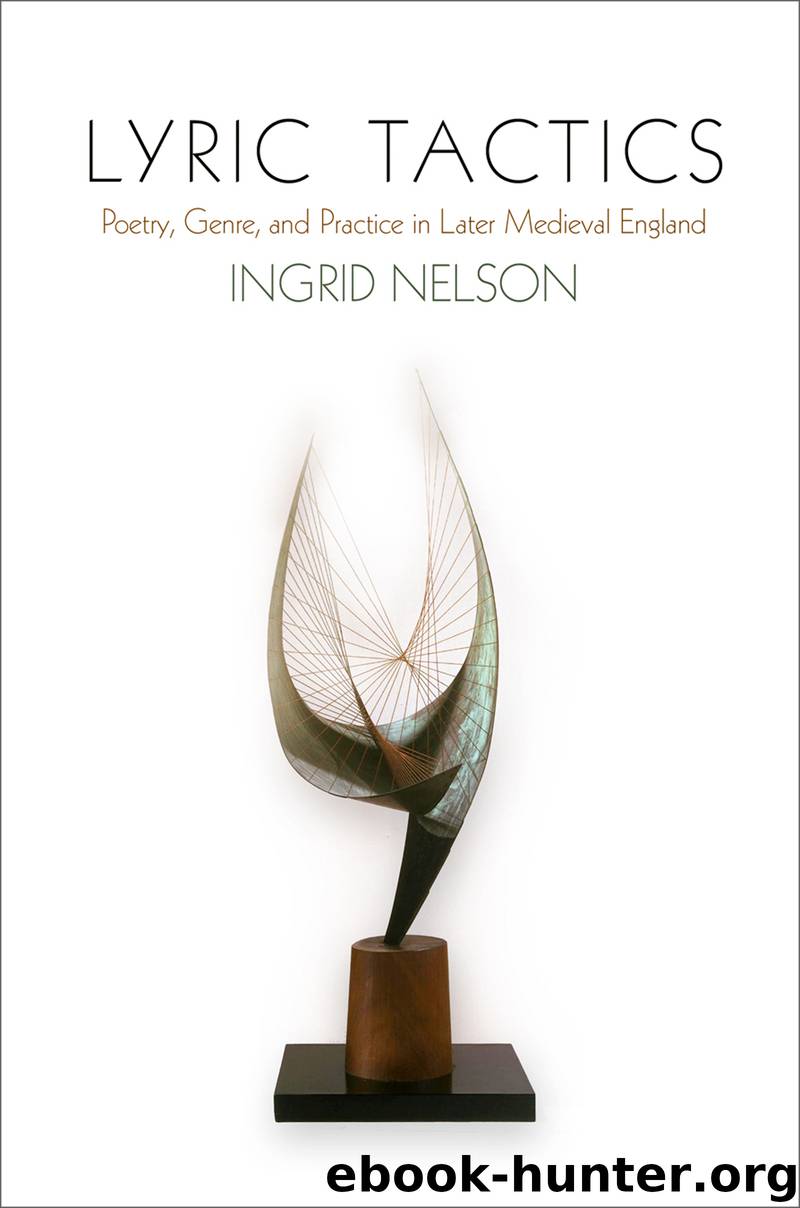Lyric Tactics by Nelson Ingrid;

Author:Nelson, Ingrid;
Language: eng
Format: epub
Publisher: University of Pennsylvania Press
Published: 2017-09-29T16:00:00+00:00
“Who made this song now with so good entente?”
Antygone answerde anoon and seyde,
“Madame, ywys, the goodlieste mayde
Of gret estat in al the town of Troye,
And let hire lif in moste honour and joye.”
leads
“Forsothe, so it semeth by hire song,”
Quod tho Criseyde, and gan therwith to sike,
And seyde, “Lord, is ther swych blisse among
Thise loveres, as they konne faire endite?” (2.877–86)
Readers have discussed this song, and Criseyde’s response to it, as both an affirmation of idealized love and as an intimation of the alienation and threat that a love affair with Troilus would pose for her.64 The song describes a kind of desire that can find fulfillment only within the hortus conclusus of its space of performance and that purports to offer a vision of “blisse” at odds with the “double sorwes” that shape the poem’s larger narrative. Yet it is precisely because of Criseyde’s oblique position in the history and the narrative of this poem that the song’s promise is unrealizable. Lee Patterson reads her as an alienated and passive subject in a masculine erotic history: Criseyde “knows and doesn’t know that she desires,” a double bind figured in the mediations of Antigone’s song.65 But as Aranye Fradenburg points out, Criseyde’s vulnerability is due not to her exclusion from a masculine chivalric culture but is created by the very fabric of that culture. In her discussion of the twin engines of “entente” and enjoyment, or jouissance, that drive this poem, Fradenburg notes that the private intention or will is inscribed in an enjoyment that circulates through groups even as it relies on individual desire.66 In other words, when Criseyde asks, “Who made this song now with so good entente,” she seems to isolate love within individual experience. Yet when she reframes her question as, “Lord, is ther swych blisse among / Thise loveres, as they konne faire endite,” she locates love’s emotions and its lyricism in a communal experience.
In summary, Antigone’s song puts forth a poetics of negotiation based on lyric tactics. Its poetics, performance, and reception all rely on contingent improvisations on established forms. French and classical poetic idioms, as well as the pedagogic form of the proverb, serve for Chaucer the role of institutionally established forms. His poetic tactics have political implications, as the episode’s Ovidian frame suggests. The tale of Philomela was a medieval touch point for the interactions between erotic desire and the politics of war, and a warning against the violent potential of each. In Troilus and Criseyde, Chaucer demonstrates a poetics and politics of negotiation that aspires to a more peaceable and equitable expression of love and politics, by means of the tactical forms and agents of Antigone’s song. These tactics are evident in the narrative of the song’s performance, in its diffuse relationships to its disparate sources, and in its use of rhetorical figures and forms, particularly metaphor and proverbs. Antigone’s song emphasizes the contingency and disjunction of these figures. The proem of Book 2 and the Ovidian frame of this lyric suggest
Download
This site does not store any files on its server. We only index and link to content provided by other sites. Please contact the content providers to delete copyright contents if any and email us, we'll remove relevant links or contents immediately.
| Ancient & Classical | Arthurian Romance |
| Beat Generation | Feminist |
| Gothic & Romantic | LGBT |
| Medieval | Modern |
| Modernism | Postmodernism |
| Renaissance | Shakespeare |
| Surrealism | Victorian |
4 3 2 1: A Novel by Paul Auster(11788)
The handmaid's tale by Margaret Atwood(7447)
Giovanni's Room by James Baldwin(6808)
Asking the Right Questions: A Guide to Critical Thinking by M. Neil Browne & Stuart M. Keeley(5355)
Big Magic: Creative Living Beyond Fear by Elizabeth Gilbert(5351)
Ego Is the Enemy by Ryan Holiday(4956)
On Writing A Memoir of the Craft by Stephen King(4662)
The Body: A Guide for Occupants by Bill Bryson(4580)
Ken Follett - World without end by Ken Follett(4443)
Bluets by Maggie Nelson(4260)
Adulting by Kelly Williams Brown(4232)
Eat That Frog! by Brian Tracy(4149)
Guilty Pleasures by Laurell K Hamilton(4116)
White Noise - A Novel by Don DeLillo(3829)
The Poetry of Pablo Neruda by Pablo Neruda(3814)
Fingerprints of the Gods by Graham Hancock(3733)
Alive: The Story of the Andes Survivors by Piers Paul Read(3730)
The Book of Joy by Dalai Lama(3695)
The Bookshop by Penelope Fitzgerald(3619)
